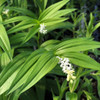Maianthemum stellatum (Smilacina) - STARRY FALSE SOLOMON'S SEAL (spreading one)
Woodland perennial, that spreads by rhizomes and is suitable for naturalizing in bigger woodland or shaded gardens.
Grows to 1.5' tall and wide, and spreads further by rhizomes, so it can form nice ground covering colonies.
Starry cream-white flowers are fragrant and appear in May/June, followed by ornamental striped seed pods that persist for the most of the season.
Half shade, dappled shade to full shade, moist to medium-moist soil, preferably with organic matter or leaf compost. It will grow fine in average garden soil with some added compost or leaf compost.
Native to most states of USA and Canada, except the deep south.
Attracts native Halictid bees (including Green Metallic bees), flower flies, and Tachinid flies (nectar or pollen). The berries are eaten by woodland songbirds, including various woodland thrushes and the Very, as well as the White-Footed Mouse. This plant is browsed by the deer.
Best for bigger woodland garden or shaded areas, where it can spread wide, combine with Aquilegia, Asarum, Brunnera, Epimedium, Hepatica, Hosta, Iris cristata, Primula, ferns,...
Picture copyright : US Perennial nursery
Pot size : square 3.5" x 5" deep pot

Maianthemum stellatum (Smilacina) - STARRY FALSE SOLOMON'S SEAL (spreading one)
Woodland perennial, that spreads by rhizomes and is suitable for naturalizing in bigger woodland or shaded gardens.
Grows to 1.5' tall and wide, and spreads further by rhizomes, so it can form nice ground covering colonies.
Starry cream-white flowers are fragrant and appear in May/June, followed by ornamental striped seed pods that persist for the most of the season.
Half shade, dappled shade to full shade, moist to medium-moist soil, preferably with organic matter or leaf compost. It will grow fine in average garden soil with some added compost or leaf compost.
Native to most states of USA and Canada, except the deep south.
Attracts native Halictid bees (including Green Metallic bees), flower flies, and Tachinid flies (nectar or pollen). The berries are eaten by woodland songbirds, including various woodland thrushes and the Very, as well as the White-Footed Mouse. This plant is browsed by the deer.
Best for bigger woodland garden or shaded areas, where it can spread wide, combine with Aquilegia, Asarum, Brunnera, Epimedium, Hepatica, Hosta, Iris cristata, Primula, ferns,...
Picture copyright : US Perennial nursery
Pot size : square 3.5" x 5" deep pot




